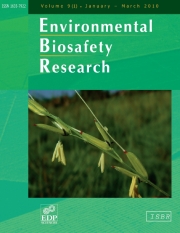Article contents
The interplay between societal concerns and the regulatory frame on GM crops in the European Union
Published online by Cambridge University Press: 24 March 2007
Abstract
Recapitulating how genetic modification technology and its agro-food products aroused strong societal opposition in the European Union, this paper demonstrates how this opposition contributed to shape the European regulatory frame on GM crops. More specifically, it describes how this opposition contributed to a de facto moratorium on the commercialization of new GM crop events in the end of the nineties. From this period onwards, the regulatory frame has been continuously revised in order to slow down further erosion of public and market confidence. Various scientific and technical reforms were made to meet societal concerns relating to the safety of GM crops. In this context, the precautionary principle, environmental post-market monitoring and traceability were adopted as ways to cope with scientific uncertainties. Labeling, traceability, co-existence and public information were installed in an attempt to meet the general public request for more information about GM agro-food products, and the specific demand to respect the consumers' and farmers' freedom of choice. Despite these efforts, today, the explicit role of public participation and/or ethical consultation during authorization procedures is at best minimal. Moreover, no legal room was created to progress to an integral sustainability evaluation during market procedures. It remains to be seen whether the recent policy shift towards greater transparency about value judgments, plural viewpoints and scientific uncertainties will be one step forward in integrating ethical concerns more explicitly in risk analysis. As such, the regulatory frame stands open for further interpretation, reflecting in various degrees a continued interplay with societal concerns relating to GM agro-food products. In this regard, both societal concerns and diversely interpreted regulatory criteria can be inferred as signaling a request – and even a quest – to render more explicit the broader-than-scientific dimension of the actual risk analysis.
Keywords
- Type
- Research Article
- Information
- Copyright
- © ISBR, EDP Sciences, 2007
References
- 31
- Cited by




